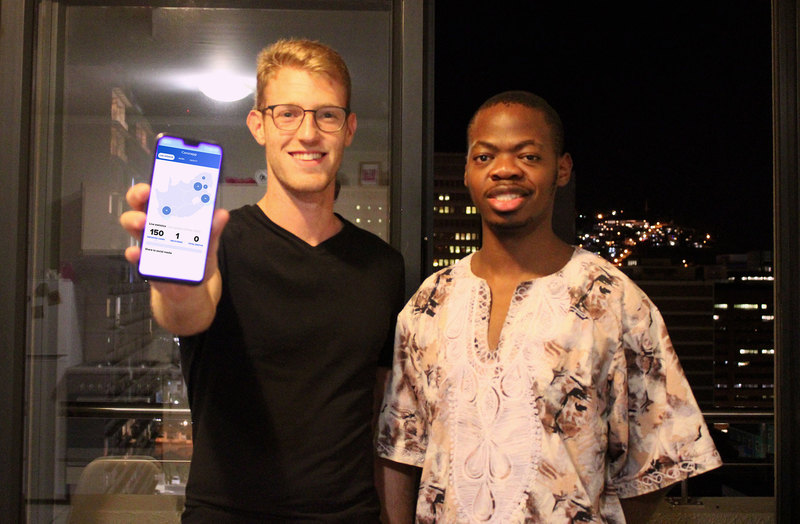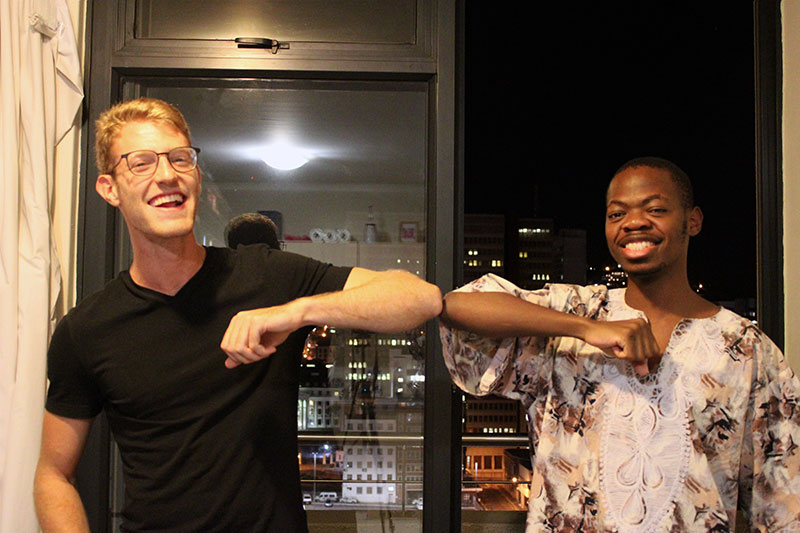UCT alumni build ‘Coronapp’ platform
20 March 2020 | Story Carla Bernardo. Photos Supplied. Read time 5 min.
In an effort to quell panic and provide South Africans with reliable and accurate information about the coronavirus (COVID-19), two University of Cape Town (UCT) alumni have built Coronapp, a centralised online platform for information about the disease.
Tamir Shklaz and Wisani Shilumani are the brains behind Coronapp.
Shklaz recently graduated from UCT with a degree in electrical and computer engineering. Since graduating, Shklaz has been working full-time on his start-up, Quillo, which he began working on during his third year at UCT. Quillo is a digital marketplace for second-hand textbooks and other items needed at university.
“I am incredibly passionate about empowering people through the use of technology and education,” said Shklaz.
Shilumani graduated from UCT in 2017 with a degree in mechanical engineering. He started developing apps and websites as a side passion while he was studying, the most notable of which is WeSit, an on-demand babysitting platform. Shilumani is currently working full-time at Allan Gray, doing what he loves most: software development.
UCT News spoke to Shklaz and Shilumani to find out more about Coronapp, the reason they built it, the features available to users and what they’ll need to make it as accessible to as many South Africans as possible.

Who is the target audience for Coronapp?
The target audience is all concerned South African citizens who are seeking reliable and up-to-date information about the COVID-19 outbreak.
Why did you build the platform?
Coronapp is a centralised repository for relevant and accurate information regarding COVID-19 in South Africa. Its purpose is to make reliable information highly accessible to South Africans to help people and prevent panic.
We saw a great deal of misinformation about the outbreak and the nature of the virus circulating on social media. The fake news around the outbreak not only created a great deal of uncertainty, but was incredibly dangerous; there were trends such as gargling bleach or supposed home remedies that could cure the virus.
Additionally, the best possible way for us to fight the virus is to flatten the curve – decrease the speed at which the virus spreads, through social distancing.
Coronapp not only informs people about the basics of the virus but encourages those of us who can afford to stay at home to practise social distancing to lessen the load on the South African healthcare system.
At the time we created the platform, there wasn’t a centralised platform where individuals could get reliable and up-to-date information. Coming from software development backgrounds, we knew a well-built platform could help South Africans protect themselves and their families from the outbreak.
How long did it take to build?
It took us one weekend to build it. We worked around the clock from morning until late at night throughout the weekend. However, development is an ongoing process of adding features that are most helpful to people using it.
Who are you choosing to aggregate news from and why? Particularly the Twitter section.
The Twitter section only shows tweets from the National Department of Health. This ensures only accurate information is displayed in real-time as the government releases more reports.
The other news sources come from a variety of places. We chose only high quality, understandable and actionable information that could help answer the following questions: What is coronavirus? How can I protect myself and others? What is social distancing and how do I implement it? What are some of the myths around the coronavirus? What are the most up-to-date actions of the South African government in response to the virus?
Is the platform mobile-friendly? And is the data zero-rated? Is this something you’d consider asking service providers about?
Yes, 90% of our traffic is from mobile devices. The website is highly optimised for cellphones, and Android users can even download the site as an app to their cellphone.
We would love to make the platform zero-rated and are currently in conversations with government bodies to get broader support.
On that note, what kind of help are you guys looking for?
The platform has already helped thousands of South Africans. However, with the help of a large partner, the platform can make a significant difference in the fight against the outbreak. We are currently searching for institutional partners, government non-profits or large companies to help raise funding for further development of the platform and to spread awareness.
If anyone reading this has contacts that may be interested in supporting the platform, please get hold of us through the contact form on the website.
Updated: 11 September 2025
 This work is licensed under a Creative Commons Attribution-NoDerivatives 4.0 International License.
This work is licensed under a Creative Commons Attribution-NoDerivatives 4.0 International License.
Please view the republishing articles page for more information.
UCT’s response to COVID-19
COVID-19 is a global pandemic that caused President Cyril Ramaphosa to declare a national disaster in South Africa on 15 March 2020 and to implement a national lockdown from 26 March 2020. UCT is taking the threat of infection in our university community extremely seriously, and this page will be updated with the latest COVID-19 information. Please note that the information on this page is subject to change depending on current lockdown regulations.
Minister of Health, Dr Joe Phaahla, has in June 2022 repealed some of South Africa’s remaining COVID-19 regulations: namely, sections 16A, 16B and 16C of the Regulations Relating to the Surveillance and the Control of Notifiable Medical Conditions under the National Health Act. We are now no longer required to wear masks or limit gatherings. Venue restrictions and checks for travellers coming into South Africa have now also been removed.
Read the latest document available on the UCT policies web page.
Campus communications
2022
UCT Community of Hope Vaccination Centre
On Wednesday, 20 July, staff from the University of Cape Town’s (UCT) Faculty of Health Sciences came together with representatives from the Western Cape Government at the UCT Community of Hope Vaccination Centre at Forest Hill Residence to acknowledge the centre’s significance in the fight against COVID-19 and to thank its staff for their contributions. The centre opened on 1 September 2021 with the aim of providing quality vaccination services to UCT staff, students and the nearby communities, as well as to create an opportunity for medical students from the Faculty of Health Sciences to gain practical public health skills. The vaccination centre ceased operations on Friday, 29 July 2022.
With the closure of the UCT Community of Hope Vaccination Centre, if you still require access to a COVID-19 vaccination site please visit the CovidComms SA website to find an alternative.
“After almost a year of operation, the University of Cape Town’s (UCT) Community of Hope Vaccination Centre, located at the Forest Hill residence complex in Mowbray, will close on Friday, 29 July 2022. I am extremely grateful and proud of all staff, students and everyone involved in this important project.”
– Vice-Chancellor Prof Mamokgethi PhakengWith the closure of the UCT Community of Hope Vaccination Centre, if you still require access to a COVID-19 vaccination site please visit the CovidComms SA website to find an alternative.
Frequently asked questions
Global Citizen Asks: Are COVID-19 Vaccines Safe & Effective?
UCT’s Institute of Infectious Disease and Molecular Medicine (IDM) collaborated with Global Citizen, speaking to trusted experts to dispel vaccine misinformation.
If you have further questions about the COVID-19 vaccine check out the FAQ produced by the Desmond Tutu Health Foundation (DTHF). The DTHF has developed a dedicated chat function where you can ask your vaccine-related questions on the bottom right hand corner of the website.
IDM YouTube channel | IDM website
“As a contact university, we look forward to readjusting our undergraduate and postgraduate programmes in 2023 as the COVID-19 regulations have been repealed.”
– Prof Harsha Kathard, Acting Deputy Vice-Chancellor: Teaching and Learning
We are continuing to monitor the situation and we will be updating the UCT community regularly – as and when there are further updates. If you are concerned or need more information, students can contact the Student Wellness Service on 021 650 5620 or 021 650 1271 (after hours), while staff can contact 021 650 5685.




















